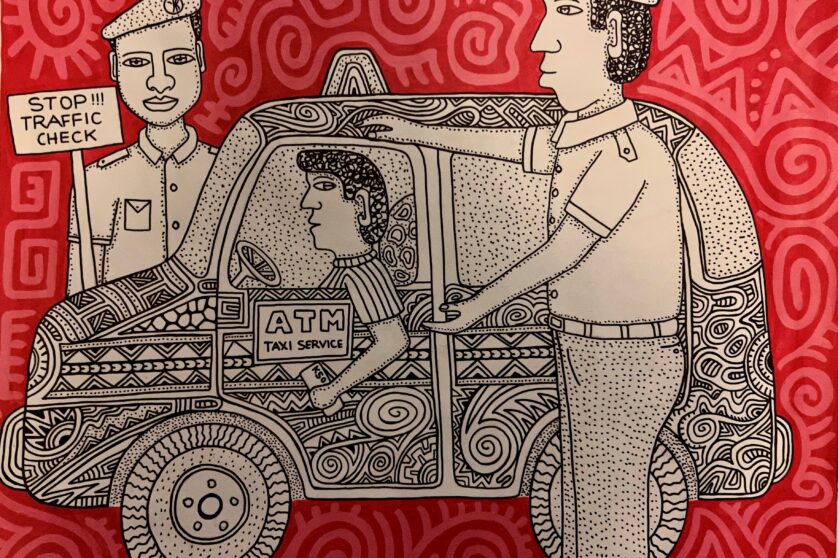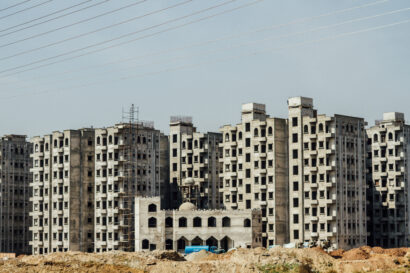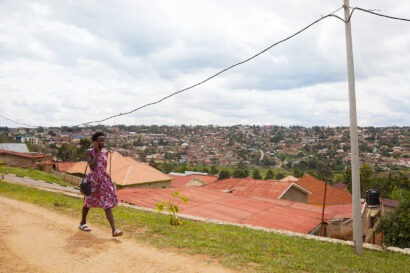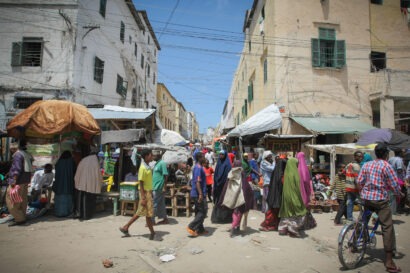Checking out checkpoints
The DIIS, together with the ICTD and the Centre on Armed Groups, hosted a three-day workshop on Copenhagen from 15-17 May 2023 on “Roadblocks and revenues: new geographies of taxation in conflict.” Bringing together 40 researchers from various countries, the workshop served as an opportunity to explore roadblocks and their role in revenue generation, state formation and conflict across the globe. It also was a first attempt to put roadblocks on the map as an object of study and to build a community of researchers from different disciplines, such as anthropologists, area studies experts, sociologists, criminologists, political scientists and geographers, economists as well as conflict analysts and practitioners.
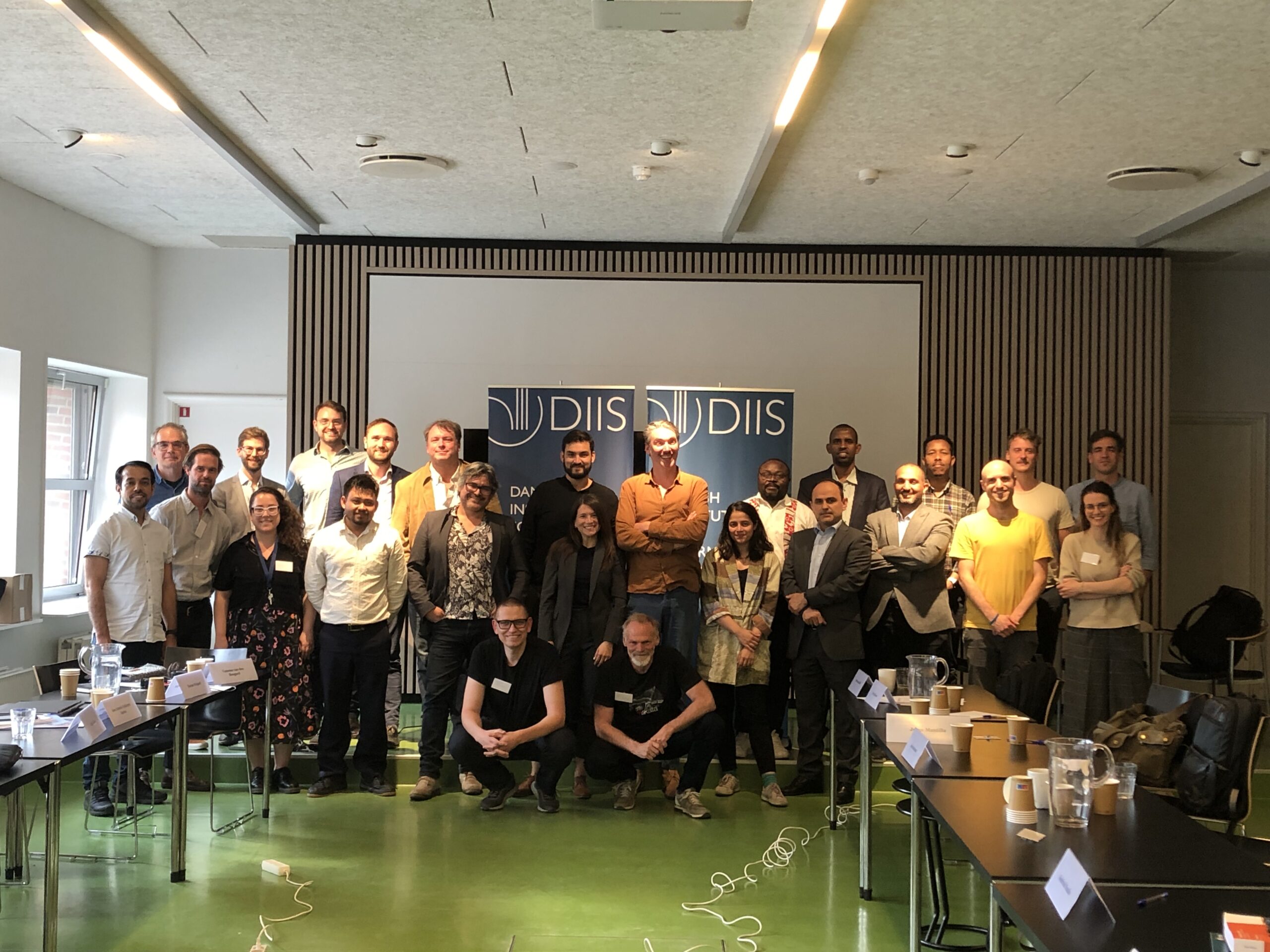
The multi-faceted nature of roadblocks: versatile, flexible, pervasive
It became evident that roadblocks are at least as diverse as they are pervasive – with regards to their form, function, location, and context. They can range from large-scale concrete structures to small make-shift barriers consisting of little more than a string stretched across the road. They are used for the most different purposes such as revenue generation, surveillance, or power demonstration and can be found at state or administrative borders, along hidden smuggling routes, and in urban centres – be it in the context of outright civil war or weak or contested statehood.
This diversity is mirrored by the different types of actors meeting and interacting at roadblocks. Roadblocks are operated by state forces/authorities, armed groups and even local communities. They target ordinary civilians during day-to-day mobility, traders, smugglers, as well as members of opposing armed groups/forces – sometimes in a targeted and selective way, sometimes indiscriminately. Different sub-groups of the population, for example women, will be impacted differently by roadblocks. As several contributions highlighted, civilians are by no means only objects of taxation, surveillance, or extortion. On the contrary, they do have agency and the impact of their negotiating passage is crucial to understand roadblocks and their implications.
Of roadblocks, revenues, and relationships
Against this backdrop, while there was great variation in terms of research topics, geographic focus and research approach, some core themes kept re-emerging throughout the workshop. Roadblocks are crucial for forming relationships. While this seems obvious for relations between their operators and passers-by, roadblocks are also central for structuring relations between operators and their competitors, be it the state or other armed groups. These relationships can range from supportive and collaborative to coercive and hostile. As such, roadblocks can be a nucleus of an emerging social contract. The scale of this relationship-building exercise can be very local but also extend over larger territories and end up in state-building. Similarly, while it can sometimes be reflective of the actor’s territorial presence, roadblocks can very well also be a means of projecting power beyond their very location, and a tool for exercising influence over people.
This does not mean, however, that operating roadblocks is always aimed at structuring relationships. A question that kept occurring throughout the workshop was the extent to which the initial motivation for setting up roadblocks is linked to the realities and practices of roadblocks as well as their implications. A question of high analytical significance, as it forces researchers to think carefully about what they can and what they cannot infer from roadblock encounters. For example, while the role of roadblocks in revenue generation was underlying many contexts, some authors found no evidence of an economic logic behind certain taxation policies, pointing towards other motives, including ideology, social values, building legitimacy, forming and projecting authority, demarcating territory, or engaging in demographic engineering. Scholars emphasised the potential for identifying the objective roadblocks or taxes pursued based on the type of tax, the types of goods taxed, the objects of taxation, as well as the location of roadblocks.
Varying perspectives
There are different perspectives through which roadblocks can be studied, each providing the opportunity for unique insights by allowing to study different phenomena. Some contributions regarded roadblocks as a tool, that is used to a certain end, such as taxation or control. Others focused on roadblocks as a site, where an extraordinarily wide range of social processes can be observed, including economic exchange, trading information and building social relations. Another difference can be seen between those looking at the macro network of roadblocks and those studying the individual roadblocks.
While most contributions focused on the implications of roadblocks, participants were equally eager to discuss aspects that affect the setting up of roadblocks. Under which conditions do actors choose roadblocks over alternative means? Empirical accounts suggest a wide range of factors, ranging from geography over actors’ capacity and the conflict’s wider actor constellation to specific purposes that roadblocks are simply more effective in achieving.
Implications for future research
Based on the diverse insights presented and generated throughout the workshop, participants agreed that if roadblocks are to become a study object in themselves, it is important to establish a common understanding of the phenomenon. While space was a common denominator of all roadblocks and checkpoints, future agenda points included setting out their defining features of, based on their physical features, degree of formalisation, coordination and centralisation, as well as staffing, inter alia. Similar to these, dilemmas emerged with regards to terminology used to depict the practices of requesting money contributions from roadblocks passers-by and the distinguishing features of such practices, ranging from taxation, to extortion, looting, pillage, predation, and theft – including based on the degree of their embeddedness in rules and procedures, and the predictability in their enforcement.
This workshop has shown that roadblocks are a study object that is linked to the widest range of phenomena and topics and thus spans many different research fields while at the same time, they are not part of any specific literature or research field. This highlights the potential as well as the challenge of this endeavour: while it won’t be easy to establish roadblocks as an object of study on its own, there is so much we can learn from such an approach. This workshop has been a great first step on this path.
Learn more about the case studies presented at the workshop in the thread below:
40 researchers from all across the globe came together last week with @diisdk @ICTDTax @Armed_Groups to explore the role that roadblocks play in revenue extraction, conflict, and state making worldwide. What did we learn? Join us for a small excursion! pic.twitter.com/xwGSP5gTJu
— Peer Schouten (@peer_schouten) May 24, 2023
Along the Venezuela-Colombia border, @jmantillaba explained how security forces have outsourced control over illegal border crossings to paramilitary groups, who monitor passage through rugged footpaths (known as trochas) pic.twitter.com/51iGmrkxx6
— Peer Schouten (@peer_schouten) May 24, 2023
Focusing on the logistics of opium mule caravans, John Buchanan explored the structure of the opium supply chain in Burma (1948-73) and the opportunities and constraints faced by armed groups attempting to access revenue from it (source: Cowell archives) pic.twitter.com/0X1K8LhzFi
— Peer Schouten (@peer_schouten) May 24, 2023
In today’s Myanmar, the civil war has meant a proliferation of government junta and resistance checkpoints. Min Aung Mann mapped 11 checkpoints by the junta and people’s defense forces, explaining their diametrically opposed workings pic.twitter.com/8zlcSJIzHs
— Peer Schouten (@peer_schouten) May 24, 2023
Moving to Northeast India, Shalaka Thakur from the @GVAGrad showed how highway taxation by armed groups in northeast India can outlive the rebellion, shape the business environment, and create a political order that lies between active conflict and peace. pic.twitter.com/wR5v0a2vZY
— Peer Schouten (@peer_schouten) May 24, 2023
Peyman Zinati talked us through the everyday life of Illicit Trade in the Iranian Kurdistan Borderlands (image: @Ikhrw_members) pic.twitter.com/NJhdk9l9FI
— Peer Schouten (@peer_schouten) May 24, 2023
@DominiqueSalla told us about the 120 roadblocks along the Douala-N’Djamena corridor linking western central Africa, which extract, according to media, 175 billion CFA a year from traffic pic.twitter.com/JwJGJfrKq8
— Peer Schouten (@peer_schouten) May 24, 2023
Abubaker Lndi joined us from Kufra in southern Libya to share insights on cross-border smuggling with Sudan and the forms of non-state governance emerging around it (image from @xchange_org) pic.twitter.com/AgwlzqITzK
— Peer Schouten (@peer_schouten) May 24, 2023
Also in Congo, @ethuin and @josaphatmusamba showed how roadblocks are spaces of negotiation, imposition and resistance–economically & in terms of identity politics and territorial claims: they are versatile instruments of governance and warfare in contexts of fragmented authority pic.twitter.com/JYjF7dHNLD
— Peer Schouten (@peer_schouten) May 24, 2023
@ObaseJ explained us how the Anglophone crisis in Cameroon has led to a proliferation of checkpoints, leading to an unbearable inflation of the cost of life pic.twitter.com/Zy4ZjYNkCf
— Peer Schouten (@peer_schouten) May 24, 2023
Jose Danton and @Ras_Karya asked whether taxing illegal goods affects rebel governance, through a case of coca production and the FARC in Colombia. (Image: https://t.co/6rFtA3toUo) pic.twitter.com/czekjOqnUf
— Peer Schouten (@peer_schouten) May 24, 2023
…A wonderful exchange across contexts & start of a collective conversation about checkpoints in theory & practice. Stay tuned! pic.twitter.com/is4OzwJnyH
— Peer Schouten (@peer_schouten) May 24, 2023
